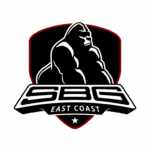Today I’m going to revisit a theme that we hear all the time in BJJ and in most cases assume we understand after we have a couple years of more of training under our belt:
Relaxation
But I’m going to argue that even if you’ve been training (and/or teaching) for many years, this topic deserves some more consideration…
In all different competitive sports we see that even among the professional ranks, which are already comprised of outliers, there are the super outliers –– the elite of the elite.
Michael Jordan, Wayne Gretsky, Tom Brady, Roger Gracie, etc.
It’s when we see these athletes able to dominate the field even against top level competition that we hear phrases like:
“There are levels to this game.”
Yes there are. But as always, just as with the question of strength and other physical attributes, I always remind people to follow up with this question:
“In what context?”
Are we talking about levels of the game only existing in high level competition, which would not apply to anyone who isn’t actively training Jiu-Jitsu with a focus on being a world-class professional competitor?
Are we talking about Jiu-Jitsu technical ability alone, or are we talking about the combination of technical ability and athleticism (and often PED use) that usually coincide when we’re looking at the field of elite BJJ athletes?
Those distinctions matter because those are all very different contexts.
Especially when we’re thinking about our own Jiu-Jitsu goals and what we’re trying to optimize for.
Specifically, I find that in almost all cases, when people talk about there being “levels to this game”, their frame of reference is one of raw outcome –– meaning, who can win more than everyone else.
And in Jiu-Jitsu circles, that will require a high degree of technical competence (no one in this day and age is going to be performing at a level like that without being technical on top of whatever physical attributes they bring to the table).
At the same time, we can still consider the question of whether elite level competitive outcomes is the best measure for most people who train Jiu-Jitsu.
I would submit to you that what most really want is a combination of these three elements:
- Effectiveness
- Efficiency
- Longevity
The three are interrelated of course. And of the three, there’s no question that effectiveness, in terms of focus on the raw outcome, takes precedence in most people’s minds and in their approach to training, over the other two.
What gets lost in translation here is that they assume they are efficient because they don’t get tired.
And they’re partially correct.
But in virtually all cases, we could still look in the mirror and if we’re being honest, admit that we could be using even less physical energy to get the desired outcome. Often much less.
Here’s the paradox:
Unless your primary goal is training at a high level against other professional athletes in specific rule sets, your effectiveness will be greater and more sustainable over time if you focus on greater efficiency now.
Or to say it more simply:
- Focusing on the raw outcome (effectiveness) short term = less efficient and reduced longevity long term, which limits potential effectiveness long term
- Focusing on efficiency short term = more efficient and increased longevity long term, which leads to much greater potential effectiveness long term
Interestingly, I mentioned that I recently had my friend, Rickson Gracie black belt Henry Akins here in town. During one of our conversations he stated that, in traveling around and training with hundreds upon hundreds of black belts, the number one issue that he observed across the board was that nearly everyone was “too tense” –– i.e., not relaxed enough.
Does that mean that they weren’t “technical”? Of course not.
Effective? No, we’re talking about some very tough black belts.
“Inefficient”? No, clearly they’re efficient or they wouldn’t even be black belts, right?
But again, the questions is: to what extent and in what context are they efficient?
Because when it comes to efficiency in achieving our desired outcomes in training –– passing, escaping, sweeping, finishing submissions, etc. –– there are levels to relaxation just like everything else.
As a matter of fact, just to give you a “behind the scenes” insight into what I’m personally working on right now, it’s focusing on optimizing my relaxation (releasing as much tension as possible) in all positions in order to control (offense) or prevent being controlled (defense).
To achieve my outcomes by using the least amount possible.
Because the number one key to long-term effectiveness and longevity in this art is using the absolute least effort to get the absolute best result.
It might feel like taking a step back, but trust me it will help you take two big steps forward when you put in the time to do this. And you’ll continue to step forward even as you age whereas those who don’t will continue to be part of the Motrin brigade.
